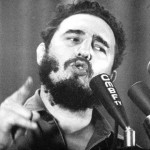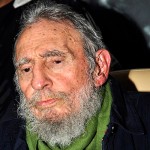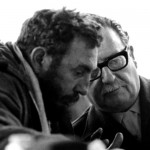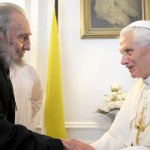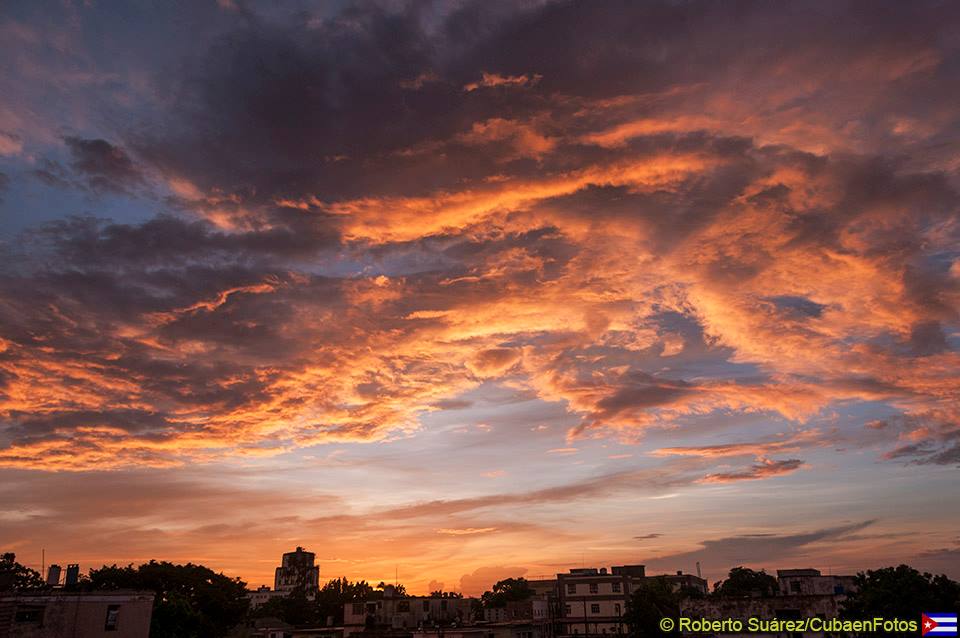FIDEL CASTRO Y EL MÁS LARGO GOBIERNO EN AMÉRICA LATINA.
Por mucho que se empeñen las redes sociales, Fidel Castro sigue vivo. El ex mandatario cubano cumple hoy 88 años apartado de la dirección política del país, que afronta un proceso reformista combinando alguna medida de calado con otras que se muestran como un mero maquillaje de las estructuras económicas e institucionales de la isla. Reformas que, en cualquier caso, siguen hurtando al pueblo cubano la capacidad de elegir a sus líderes. Reformas que siguen obviando la democracia.
La visita del presidente ruso Putin a Cuba hace unos dias dejo aclarado con Raúl Castro, que el país sigue interesado en marcar un perfil muy determinado en el ámbito internacional.
Aunque las reformas son insuficientes, éstas se han precipitado desde que Fidel Castro abandonase el poder en el verano de 2006. Su hermano Raúl le sustituyó entonces y asumió formalmente como presidente en febrero de 2008 y como primer secretario del Partido Comunista en abril de 2011. Fue en ese último momento cuando se plantearon seriamente unas medidas que pretenden «actualizar» el modelo socialista, nunca acabar con él.
Pero que las medidas no terminan de funcionar, y que no responden a los anhelos de democracia y prosperidad de muchos ciudadanos lo demuestran los datos de emigración del ejercicio 2012. 46.662 personas abandonaron el país, el dato más elevado desde 1994, año que se produjo la crisis de los balseros y la segunda más elevada desde el éxodo de 1980, cuando más de 125.000 cubanos abandonaron la isla a través del puerto del Mariel.
.. desde que Raúl Castro asumió el mando político del país sí se han anunciado algunas reformas que pretenden modificar la realidad social y económica del país. La primera y más relevante es una reforma migratoria que suprimían una multitud de trámites burocráticos que se imponían a los cubanos para poder viajar. También se limitó a dos periodos consecutivos de cinco años el límite para mandatos políticos y estatales, muy en la línea de lo determinado por el Partido Comunista Chino. Y es que en la renovación de las anquilosadas estructuras soviéticas, el modelo que parecen elegir en la isla es el del país asiático, no contemplando por tanto la democracia y la pluralidad política.
Aunque desde el Gobierno han reconocido la intención de que las estructuras estatales sigan contribuyendo de manera considerable al PIB del país. Pero se trató de llevar a cabo un reordenamiento tras la ampliación del trabajo privado a 178 actividades, en un intento por fomentar el empleo autónomo. Estos empleos pretenden fomentarse con una nueva política crediticia, que sirve también para el proyecto de rehabilitación de viviendas.
Esta medida de fomento de actividades privadas se complementa con la reducción de las plantillas «infladas e innecesarias» que pretende reducir hasta 2015 medio millón de empleos. Una reforma necesitada y aunque con ciertas reestricciones, también se levantó el veto para la compraventa de automóviles y viviendas.
Una de las cosas que lastran tradicionalmente la economía cubana son las costosas importaciones de alimentos. Por ello, en julio de 2008 Raúl Castro aprobó la entrega en usufructo de tierras ociosas para dinamizar la agricultura, aunque también posteriormente se permitió la construcción de viviendas en esos terrenos. El primer periodo de ese proyecto trasladó 1,5 millones de hectareas de tierras estatales desaprovechadas a manos de algo más de 150.000 nuevos agricultores.
Otra de las reformas de más incidencia fue que se permitiese a los cubanos comprar teléfonos móviles, hasta 2008 solo permitido a empresas, funcionarios y residentes extranjeros, además de levantar el veto sobre la adquisición de ordenadores, electrodomésticos o la posibilidad de alojarse en los hoteles para turistas.
Como reconoció Marino Murillo, que recibió el encargo de dirigir desde la vicepresidencia la nueva planificación económica, a las agencias Reuters y AP, la primera fase de las reformas consistía en «eliminar prohibiciones en la sociedad». Y es al adalid de esa prohibiciones en la sociedad, el hombre que edificó una economía que su hermano trata de corregir, a quien Cuba rinde hoy homenaje. Conciertos y exposiciones para loar a un líder que sobrevive a amigos y enemigos con una longevidad que pocos esperaban cuando una enfermedad intestinal le obligó a pasar a un segundo plano. Desde esa posición contemplará como Cuba aplaude, mientras parchea un sistema obsoleto. La democracia sigue esperando.
ABC,Spain/V.R.A./Excerpts/InternetPhotos/www.thecubanhistory.com
The CUban History, Hollywood.
Arnoldo Varona, Editor.
FIDEL CASTRO AND THE LONGEST LEADERSHIP IN AMERICA.
As much as the social media wants or insist on the contrary, Fidel Castro is still alive. Former Cuban president meets today 88 years away from the country’s political leadership, facing a reform process combining some extent with other draft shown as a mere make-economic and institutional structures of the island. Reforms that, in any case, are stealing the Cuban people the ability to choose their leaders. Reforms are ignoring democracy.
The visit of Russian President Putin to Cuba a few days ago probe that Raul Castro, with his leadership the country is looking to score a certain profile in the international arena.
Although the reforms are insufficient, they have rushed since Fidel Castro leave power in the summer of 2006 he was replaced by his brother Raul and then formally took over as president in February 2008 and as first secretary of the Communist Party in April 2011. it was in that last moment when some measures intended to “update” the socialist model, never kill it seriously raised.
But the measures did not end up working, and do not respond to the aspirations of democracy and prosperity for many citizens shown by data migration for the year 2012 46,662 people left the country, the highest figure since 1994, the year that occurred the rafter crisis and the second highest since the exodus of 1980, when more than 125,000 Cubans left the island through the port of Mariel.
.. Since Raul Castro assumed political control of the country itself will have announced some reforms aimed at changing the social and economic realities. The first and most important is immigration reform which removed a multitude of paperwork that were imposed on Cubans to travel. It was also limited to two consecutive five-year limit for politicians and state mandates, much along the line determined by the Chinese Communist Party. And in the renewal of the ossified Soviet structures, choose the model that appear on the island is the Asian country, not looking for both democracy and political pluralism.
Although from the Government recognized the intention that state structures continue to contribute significantly to the country’s GDP manner. But he tried to carry out a reorganization after enlargement 178 private work activities, in an attempt to increase self-employment. These jobs encouraged to seek a new credit policy, which also serves for housing rehabilitation project.
This building measure private activities is complemented by the reduction of “inflated and unnecessary” templates that aims to reduce by 2015 half a million jobs. One needed reform and although certain reestricciones also veto for the sale of cars and homes rose.
One of the things that traditionally hinder the Cuban economy are costly food imports. Therefore, in July 2008, Raúl Castro approved the delivery of idle land in usufruct to boost agriculture, but also subsequently building homes in these areas were allowed. The first period of the project moved 1.5 million acres of state lands wasted at the hands of more than 150,000 new farmers.
Another incidence was more reforms that allow Cubans to buy mobile phones, to 2008 only allowed companies, officials and foreign residents, in addition to lift the ban on the purchase of computers, appliances, or the possibility of staying in hotels for tourists.
As recognized by Marino Murillo, who was commissioned to lead from the new vice economic planning, the agencies Reuters and AP, the first phase of the reforms was to “eliminate prohibitions in society.” He is the leader of the prohibitions in society, the man who built an economy that tries to correct his brother, whom Cuba pays tribute today. Concerts and exhibitions to praise a leader who survives friends and enemies with a longevity that few expected when an intestinal illness forced him to move to the background. From that position it will consider as Cuba applauds while an obsolete system patches. Democracy still waiting.
ABC, Spain / VRA / Excerpts / InternetPhotos / www.thecubanhistory.com
The Cuban History, Hollywood.
Arnoldo Varona, Editor.



 FIDEL CASTRO, the longest leadership in America. (Photos) ** EL MÁS LARGO Gobierno de América Latina.
FIDEL CASTRO, the longest leadership in America. (Photos) ** EL MÁS LARGO Gobierno de América Latina.